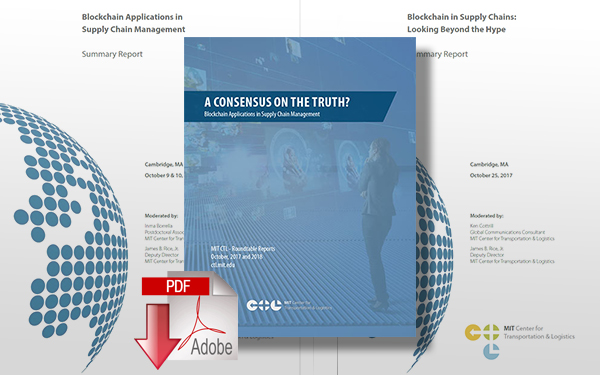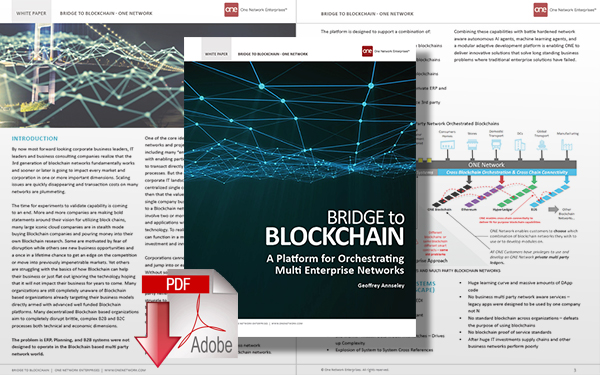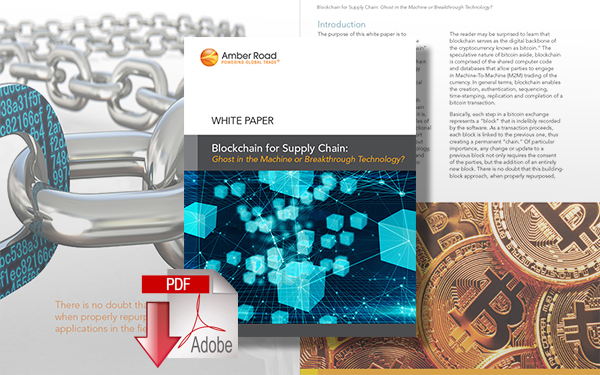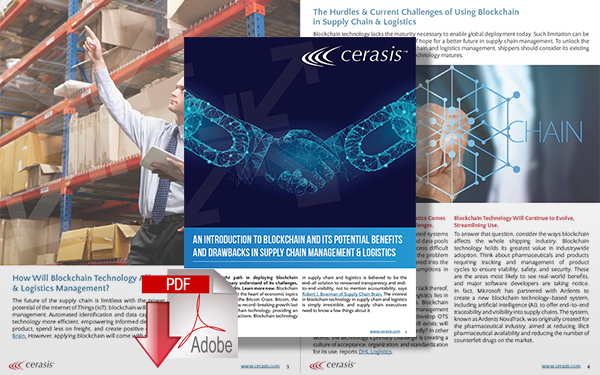90% of Blockchain-Based Supply Chain Initiatives Will Suffer ‘Blockchain Fatigue’ by 2023

According to a survey by Gartner, supply chain leaders are failing to find suitable use cases for blockchain technology mainly because supply chain blockchain projects are very limited and do not match the initial enthusiasm for the technology’s application.
Blockchain in the Supply Chain
Blockchain remains a popular topic, but supply chain leaders are failing to find suitable use cases.
By 2023, 90% of blockchain-based supply chain initiatives will suffer ‘blockchain fatigue’ due to a lack of strong use cases, according to Gartner, Inc.
A Gartner supply chain technology survey of user wants and needs* found that only 19% of respondents ranked blockchain as a very important technology for their business, and only 9% have invested in it.
This is mainly because supply chain blockchain projects are very limited and do not match the initial enthusiasm for the technology’s application in supply chain management.
“Supply chain blockchain projects have mostly focused on verifying authenticity, improving traceability and visibility, and improving transactional trust,” said Alex Pradhan, senior principal research analyst at Gartner.
“However, most have remained pilot projects due to a combination of technology immaturity, lack of standards, overly ambitious scope and a misunderstanding of how blockchain could, or should, actually help the supply chain. Inevitably, this is causing the market to experience blockchain fatigue.”
The budding nature of blockchain makes it almost impossible for organizations to identify and target specific high-value use cases.
Instead, companies are forced to run multiple development pilots using trial and error to find ones that might provide value.
Additionally, the vendor ecosystem has not fully formed and is struggling to establish market dominance.
Another challenge is that supply chain organizations cannot buy an off-the-shelf, complete, packaged blockchain solution.
“Without a vibrant market for commercial blockchain applications, the majority of companies do not know how to evaluate, assess and benchmark solutions, especially as the market landscape rapidly evolves,” said Ms. Pradhan.
“Furthermore, current creations offered by solution providers are complicated hybrids of conventional blockchain technologies. This adds more complexity and confusion, making it that much harder for companies to identify appropriate supply chain use cases.”
As blockchain continues to develop in supply chains, Gartner recommends that organizations remain cautious about early adoption and not to rush into making blockchain work in their supply chain until there is a clear distinction between hype and the core capability of blockchain.
“The emphasis should be on the proof of concept, experimentation and limited-scope initiatives that deliver lessons, rather than high-cost, high-risk, strategic business value,” said Ms. Pradhan.
Related Paper: Running Blockchain Pilots for your Supply Chain
Gartner clients can read more in the report “Predicts 2019: Future of Supply Chain Operations.” More predictions for all aspects of the IT industry can be found in “Predicts 2019: Leadership Means Expanding Options, Not Limiting Them - A Gartner Trend Insight Report,” a collection of research aimed at helping CIOs and other IT leaders focus on how the landscape is shifting for individuals, businesses and IT organizations.
More information on how to innovate and scale the supply chain can be found on the Gartner Chief Supply Chain Officer Insight Hub.
About the Survey
*The survey was conducted between November 2017 and February 2018 among 303 respondents from North America, EMEA, Asia/Pacific, and South America. The survey explored the role technology plays in supply chains, how supply chain organizations leverage technology for competitive advantage, and their changing views about how best to exploit technology in supply chain management organizations.
Gartner Supply Chain Executive Conferences
Gartner analysts will provide additional analysis and information on supply chain trends at the Gartner Supply Chain Executive Conferences 2019, taking place on May 13-16 in Phoenix and June 17-19 in Barcelona. Follow news and updates from the events on Twitter using #GartnerSCC.
Editors Note: In January of this year, the Boston Consulting Group (BCG) also reported that blockchain adoption had proved slower than expected. BCG suggests the technology has presented stakeholders with a troubling paradox, read “Resolving the Blockchain Paradox in Transportation and Logistics.”
The Problem with Blockchain (and Security)
In a recent article titled “Blockchain is Vastly Overrated; Supply Chain Cybersecurity is Vastly Underrated,” we made a bold - perhaps outrageous - statement: Blockchain is vastly overrated.
Our argument is not that blockchain is irrelevant to supply chain cyber security; rather, we argue that while blockchain may be an important tool, based on the headlines, you might have the impression that it is the cure to whatever ails you, much the way RFID was touted as a supply chain wonder technology a decade ago. It is not. Here’s why.
At its roots, blockchain is structured to ensure security in an environment where trust is low and where there is a concern that someone can alter data, such as an individual altering an electronic check so that a $500 deposit becomes a $5,000 deposit.
Blockchain does this by creating multiple distributed copies, or ledgers, of the transaction. For a fraud like the one described above to be successful, all copies must be changed - something that blockchain’s structure makes almost impossible to achieve.
“Our argument is not that blockchain is irrelevant to supply chain cyber security; rather, we argue that while blockchain may be an important tool, based on the headlines, you might have the impression that it is the cure to whatever ails you.”
Steven A. Melnyk, Cheri Speier-Pero and Elizabeth Connors
Viewed from this perspective, we contend that blockchain addresses some, but not all, of the concerns over supply chain security.
For example, blockchain does address threats to IT. It would have been effective for combating changes to the MPS at the chemical company we described at the start of this article because it would have been nearly impossible to change all of the ledger instances.
However, it would not have protected the intellectual property or operational technology that was also targeted in that attack. In other words, blockchain does not by itself deal with all of the dimensions of supply chain cyber security.
Download the MIT Center for Transportation & Logistics Roundtable Reports A Consensus On The Truth? Blockchain Applications in Supply Chain Management
Related Article: Unlocking Blockchain’s Potential in Your Supply Chain
A.T. Kearney industry experts provide insights into blockchain's supply chain potential, and why, beneath all the hype, blockchain is a maturing technology that offers great promise.
Related Blockchain White Papers
A Consensus On The Truth? Blockchain Applications in Supply Chain Management
The MIT Center for Transportation & Logistics held two roundtable events, one in 2017 another in 2018, with supply chain practitioners on the topic of blockchain in the supply chain – this roundtable report examines the blockchain challenges and concerns discussed at both events. Download Now!
Bridge to Blockchain: A Platform for Orchestrating Multi-Enterprise Networks
In this white paper, you will learn why blockchain platforms vary widely in terms capability, disclosure, confidentiality, anonymity, the cost to use, and speed, and why companies need to leverage more than one blockchain network to realize game-changing business models. Download Now!
Blockchain for Supply Chain: Ghost in the Machine or Breakthrough Technology?
The purpose of this white paper is to demonstrate the myriad ways in which the open-source software known as “blockchain” can be applied to international trade. Download Now!
An Introduction to Blockchain in Supply Chain Management
In this exclusive, and educational resource, “An Introduction to Blockchain and Its Potential Benefits and Drawbacks in Supply Chain Management,” you will learn and understand Blockchain's role in the industry and what supply chain executives need to consider now and in the future. Download Now!
More Resources on Blockchain (in the Supply Chain)
Article Topics
Amber Road News & Resources
Logistics Platforms: Ways Companies Can Win In the Digital Era Ethical Sourcing – The Business Imperative (and Advantage) How Rules of Origin Really Do Make a Difference for Sourcing Practices E2open’s acquisition of Amber Road is a done deal E2open Completes Acquisition of Amber Road Bridging the Data Gap Between Sourcing and Logistics Medical Technologies Company Remedies Complex Compliance Operations More Amber RoadLatest in Technology
Walmart Unleashes Autonomous Lift Trucks at Four High-Tech DCs Talking Supply Chain: Procurement and the AI revolution 80% of Companies Still Unsure How to Best Leverage AI, Study Finds Supply Chain Stability Index: “Tremendous Improvement” in 2023 AI Not a Priority for Retailers and CPG Companies How Video Games Can Enhance Your Transformation Project The Crucial Importance of SOC 2 Certification in Today’s Digital Landscape More Technology




















